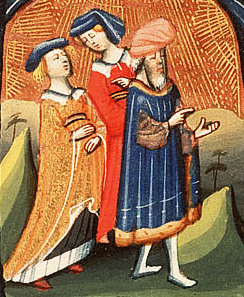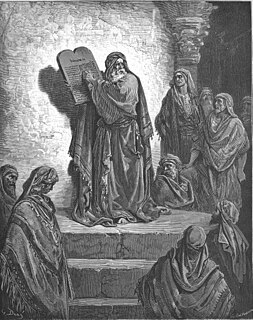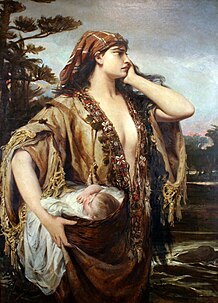 W
WAccording to the Bible, the Tribe of Levi is one of the tribes of Israel, traditionally descended from Levi, son of Jacob. The descendants of Aaron, who was the first kohen gadol of Israel, were designated as the priestly class, the Kohanim.
 W
WAaron was a prophet, high priest, and the elder brother of Moses in the Abrahamic religions. Knowledge of Aaron, along with his brother Moses, comes exclusively from religious texts, such as the Bible and Quran.
 W
WElkanah was, according to the Books of Samuel, the husband of Hannah, and the father of her children including her first, Samuel. Elkanah practiced polygamy; his other wife, less favoured but bearing more children, was named Peninnah. The names of Elkanah's other children apart from Samuel are not given. Elkanah plays only a minor role in the narrative, and is mostly a supporting character to Eli, Hannah, and Samuel.
 W
WEzekiel is the central protagonist of the Book of Ezekiel in the Hebrew Bible.
 W
WEzra, also called Ezra the Scribe and Ezra the Priest in the Book of Ezra, was a Jewish scribe (sofer) and priest (kohen). In Greco-Latin Ezra is called Esdras. According to the Hebrew Bible he was a descendant of Sraya the last High Priest to serve in the First Temple, and a close relative of Joshua the first High Priest of the Second Temple. He returned from Babylonian exile and reintroduced the Torah in Jerusalem. According to 1 Esdras, a Greek translation of the Book of Ezra still in use in Eastern Orthodoxy, he was also a High Priest. Rabbinic tradition holds that he was an ordinary member of the priesthood.
 W
WJeremiah, also called the "weeping prophet", was one of the major prophets of the Hebrew Bible. According to Jewish tradition, Jeremiah authored the Book of Jeremiah, the Books of Kings and the Book of Lamentations, with the assistance and under the editorship of Baruch ben Neriah, his scribe and disciple.
 W
WAccording to the Bible, Jochebed was a daughter of Levi and mother of Aaron, Miriam and Moses. She was the wife of Amram, as well as his aunt. No details are given concerning her life. According to Jewish legend, Moses's Mother is buried in the Tomb of the Matriarchs, in Tiberias. She is praised for her faith in God.
 W
WKorah or Kórach, son of Izhar, is an individual who appears in the Book of Numbers of the Hebrew Bible and four different verses in the Quran, known for leading a rebellion against Moses.
 W
WLevi was, according to the Book of Genesis, the third son of Jacob and Leah, and the founder of the Israelite Tribe of Levi and the grandfather of Aaron and Moses. Certain religious and political functions were reserved for the Levites.
 W
WMiriam was described in the Hebrew Bible as the daughter of Amram and Jochebed, and the older sister of Moses and Aaron. She was a prophetess and first appears in the Book of Exodus.
 W
WMoses, also known as Moshe Rabbenu, is the most important prophet in Judaism, and an important prophet in Christianity, Islam, the Baháʼí Faith, and a number of other Abrahamic religions. In the biblical narrative he was the leader of the Israelites and lawgiver, to whom the authorship of the first five books of the bible, the Torah, or "acquisition of the Torah from heaven," is attributed.
 W
WSamuel is a figure who, in the narratives of the Hebrew Bible, plays a key role in the transition from the period of the biblical judges to the institution of a kingdom under Saul, and again in the transition from Saul to David. He is venerated as a prophet by Jews, Christians, and Muslims. In addition to his role in the Hebrew Scriptures, Samuel is mentioned in the New Testament, in rabbinical literature, and in the second chapter of the Qur'an. He is also treated in the fifth through seventh books of Josephus's Antiquities of the Jews, written in the first century CE (AD). He is first called the Seer in 1 Samuel 9:9.
 W
WShimei is the name of a number of persons referenced in the Hebrew Bible and Rabbinical literature.The second son of Gershon and grandson of Levi. The family of the Shimeites, as a branch of the tribe of Levi, is mentioned in Numbers 3:18, 21; 1 Chronicles 23:7, 10, 11 ; and in Zechariah 12:13. In the New Testament the name occurs in Luke 3:26, spelled Semei in the King James Version.